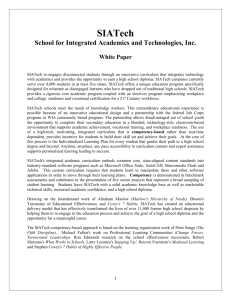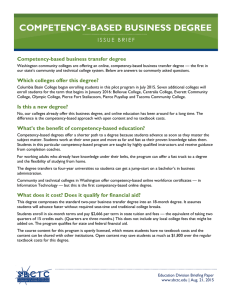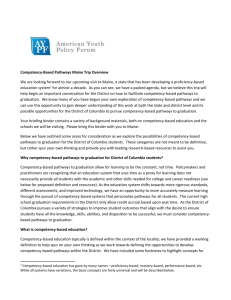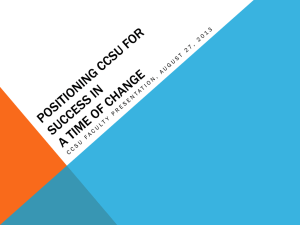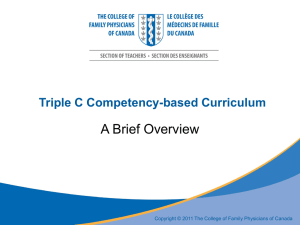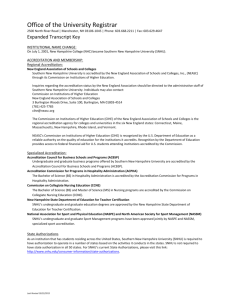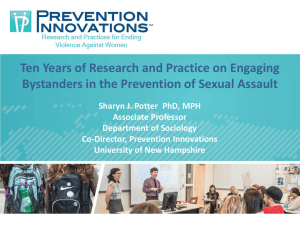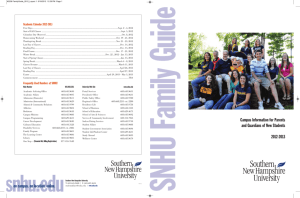How Competency Education is Changing Higher
advertisement
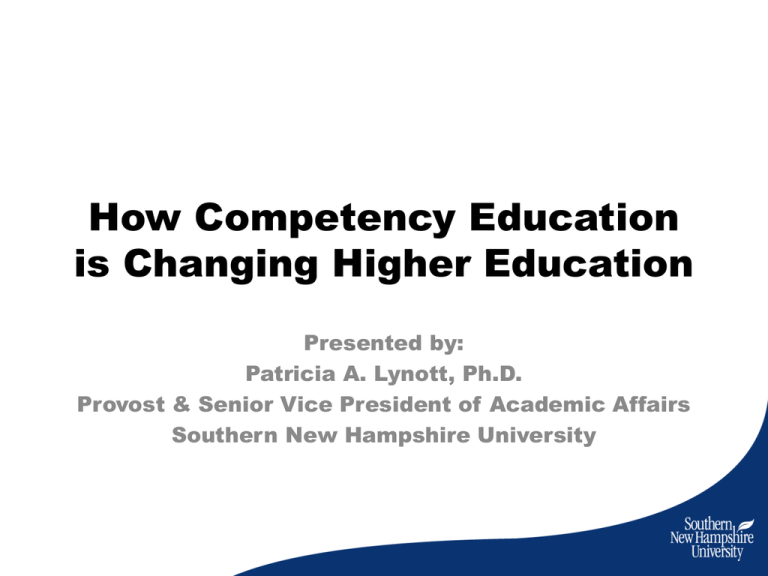
How Competency Education is Changing Higher Education Presented by: Patricia A. Lynott, Ph.D. Provost & Senior Vice President of Academic Affairs Southern New Hampshire University Agenda • Definition of competency-based education and how it works • Why competency-based education is attracting so much interest from policy makers and potential students • How colleges that are organized on traditional methods of awarding credit can explore competencybased offerings and get them off the ground • Question and answer period • Suggested readings for further exploration of competency-based education Origin & Timeline of SNHU • 1932: Shapiro Family establishes the New Hampshire School of Accounting and Secretarial Science. • 1961: The school was incorporated and renamed the New Hampshire College of Accounting and Commerce. • 1963: The State of New Hampshire granted the college its charter, giving it degree-granting authority. • 1968: The college became a non-profit institution under a board of trustees. • 1969: The college was renamed New Hampshire College Origin & Timeline of SNHU • 1995: New Hampshire College established a “distance-ed” program which was the foundation of what is now SNHU’s College of Online and Continuing Education (COCE). • 2001: New Hampshire College became Southern New Hampshire University. • Today: SNHU is a private, comprehensive university serving over 35,000 students. We award the associate’s, bachelor’s, master’s, and doctoral (Ph.D. and Ed.D.) degrees. SNHU’s Three Colleges Southern New Hampshire University University College (UC) College of Online & Continuing Education (COCE) College for America (CfA) Competency-based Education Defined • What is competency-based education and how does it work? Competency-based Education Defined • Federal definition of direct assessment competencybased programs: • A direct assessment program is an instructional program that, in lieu of credit hours or clock hours as a measure of student learning, utilizes direct assessment of student learning, or recognizes the direct assessment of student learning by others. SNHU’s Competency-based Programs Southern New Hampshire University University College (UC) 3YHonors Program: BS in Business Administration College of Online & Continuing Education (COCE) College for America (CfA) AS in General Studies National Interest in Competency-based Education • Why is competency-based education attracting so much interest from policy makers and potential students? Launching Competency-based Education • How can colleges that are organized on traditional methods of awarding credit can explore competencybased offerings and get them off the ground? Suggested Reading • AAC&U. (2011). AAC&U statement on the Lumina Foundation for Education's Proposed Degree a Qualifications Profile. Retrieved from http://www.aacu.org/about/statements/documents/lumina_dqs_2011.pdf • Alexander, L. (2009, October 26). Why college should take only three years. Newsweek, 26-29. • Archibald, R. B., & Feldman, D.H. (2010). Why does college cost so much? New York, NY: Oxford University Press. • Arum, R., & Roksa, J. (2011). Academically adrift: Limited learning on college campuses. Chicago: University of Chicago Press. • Bradley, M., &Painchaud, S. (2009). Innovation in higher education at Southern New Hampshire University: The design, development, and success of a three year honors curriculum in business administration. In Proceedings of the 14th Annual Conference (pp. 29-47). Athens, Greece: European Council of Business Education. Suggested Reading • Cambridge, D. (2010). Eportfolios for lifelong learning and assessment. San Francisco, C.A: JosseyBass. • Cohen, A. M., & Kisker, C. B. (2010). The shaping of American higher education: Emergence and growth of the contemporary system (2nd Ed.). San Francisco, CA: Jossey-Bass. • Fain, Paul. 2013. "Rose of Customized Learning." Inside Higher Ed (http://www.insidehighered.com/news/2013/03/05/competency-based-education-continuesspread[November 2013]). • Fischer, K. (2011, May 15). Crisis of confidence threatens colleges. The Chronicle of Higher Education. Retrieved from http://chronicle.com/article/Higher-Education-in-Americaa/127530/?sid=at&utm_source=at&utm-medium=en. • Kamenetz, Anya, October 29, 2013. "Are You Competent? Prove It." The New York Times. http://www.nytimes.com/2013/11/03/education/end life/degrees-based-on-what-you-can-do Suggested Reading • Klein-Collins, Rebecca and Elizabeth Baylor, "Meeting Students Where They Are: Profiles of Students in Competency-Based Degree Programs," A Publication of the Center for American Progress and the Council for Adult and Experiential Learning. November 2013. • Knapp, L. G., Kelly-Reid, J. E., & Ginder, S. A. (2010). Postsecondary institutions and price of attendance in the United States: Fall 2009, degrees and other awards conferred: 2008-09, and 12month enrollment: 2008-09 (NCES 2010-161). U.S. Department of Education. Washington, DC: National Center for Education statistics. Retrieved from http://nces.ed.gov/pubs2010/2010161.pdf • Laitinen, Amy. 2012. "Cracking the Credit Hour." New York: New America Foundation and Education Sector (http://higheredwatch.newamerica.net.sites/newamerica.net/files/policy docs/Cracking_the_Credit_Hour_Sept5_0.pdf). • LeBlanc, Paul J. 2013. "Thinking about Accreditation in a Rapidly Changing World." EDUCAUSE Review 48 (2) (http://www.educause.edu/ero/article/thinking-about-accreditation-rapidly-changingworld). • Lumina Foundation for Education. (2011, January). The degree qualifications profile. Retrieved from http://www.luminafoundation.org/publications/The_Degree_Qualifications_Profile.pdf • Neem, Johann N. "Experience Matters: Why Competency-Based Education Will Not Replace Seat Time," Liberal Education, Vol. 99, No. 4, Fall 2013, pp. 26-29. • Walvoord, B. E. (2010). Assessment clear and simple: A practical guide for institutions, departments, and general education (2nd Ed.). San Francisco, CA: Jossey-Bass. Contact Information Patricia A. Lynott, Ph.D. p.lynott@snhu.edu 603.645.9695
